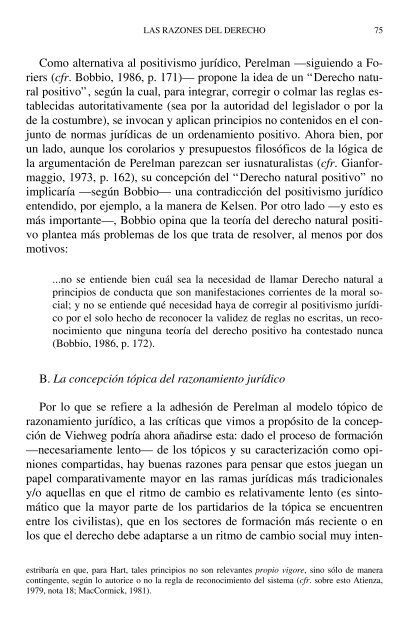LAS RAZONES DEL DERECHO Teo rías de la ar gu men ta ción ju rí di ca
You also want an ePaper? Increase the reach of your titles
YUMPU automatically turns print PDFs into web optimized ePapers that Google loves.
<strong>LAS</strong> <strong>RAZONES</strong> <strong>DEL</strong> <strong>DERECHO</strong> 75<br />
Como alternativa al positivismo <strong>ju</strong><strong>rí</strong><strong>di</strong>co, Perelman —si<strong>gu</strong>iendo a Foriers<br />
(cfr. Bobbio, 1986, p. 171)— propone <strong>la</strong> i<strong>de</strong>a <strong>de</strong> un “Derecho natural<br />
positivo”, según <strong>la</strong> cual, p<strong>ar</strong>a integr<strong>ar</strong>, corregir o colm<strong>ar</strong> <strong>la</strong>s reg<strong>la</strong>s es<strong>ta</strong>blecidas<br />
autori<strong>ta</strong>tiva<strong>men</strong>te (sea por <strong>la</strong> autoridad <strong>de</strong>l legis<strong>la</strong>dor o por <strong>la</strong><br />
<strong>de</strong> <strong>la</strong> costumbre), se invo<strong>ca</strong>n y apli<strong>ca</strong>n principios no contenidos en el con<strong>ju</strong>nto<br />
<strong>de</strong> normas <strong>ju</strong><strong>rí</strong><strong>di</strong><strong>ca</strong>s <strong>de</strong> un or<strong>de</strong>namiento positivo. Ahora bien, por<br />
un <strong>la</strong>do, aunque los coro<strong>la</strong>rios y presupuestos filosóficos <strong>de</strong> <strong>la</strong> lógi<strong>ca</strong> <strong>de</strong><br />
<strong>la</strong> <strong>ar</strong><strong>gu</strong><strong>men</strong><strong>ta</strong><strong>ción</strong> <strong>de</strong> Perelman p<strong>ar</strong>ez<strong>ca</strong>n ser iusnaturalis<strong>ta</strong>s (cfr. Gianformaggio,<br />
1973, p. 162), su concep<strong>ción</strong> <strong>de</strong>l “Derecho natural positivo” no<br />
implic<strong>ar</strong>ía —según Bobbio— una contra<strong>di</strong>c<strong>ción</strong> <strong>de</strong>l positivismo <strong>ju</strong><strong>rí</strong><strong>di</strong>co<br />
enten<strong>di</strong>do, por ejemplo, a <strong>la</strong> manera <strong>de</strong> Kelsen. Por otro <strong>la</strong>do —y esto es<br />
más impor<strong>ta</strong>nte—, Bobbio opina que <strong>la</strong> teo<strong>rí</strong>a <strong>de</strong>l <strong>de</strong>recho natural positivo<br />
p<strong>la</strong>ntea más problemas <strong>de</strong> los que tra<strong>ta</strong> <strong>de</strong> resolver, al <strong>men</strong>os por dos<br />
motivos:<br />
...no se entien<strong>de</strong> bien cuál sea <strong>la</strong> necesidad <strong>de</strong> l<strong>la</strong>m<strong>ar</strong> Derecho natural a<br />
principios <strong>de</strong> conduc<strong>ta</strong> que son manifes<strong>ta</strong>ciones corrientes <strong>de</strong> <strong>la</strong> moral social;<br />
y no se entien<strong>de</strong> qué necesidad haya <strong>de</strong> corregir al positivismo <strong>ju</strong><strong>rí</strong><strong>di</strong>co<br />
por el solo hecho <strong>de</strong> reconocer <strong>la</strong> vali<strong>de</strong>z <strong>de</strong> reg<strong>la</strong>s no escri<strong>ta</strong>s, un reconocimiento<br />
que nin<strong>gu</strong>na teo<strong>rí</strong>a <strong>de</strong>l <strong>de</strong>recho positivo ha contes<strong>ta</strong>do nun<strong>ca</strong><br />
(Bobbio, 1986, p. 172).<br />
B. La concep<strong>ción</strong> tópi<strong>ca</strong> <strong>de</strong>l razonamiento <strong>ju</strong><strong>rí</strong><strong>di</strong>co<br />
Por lo que se refiere a <strong>la</strong> adhesión <strong>de</strong> Perelman al mo<strong>de</strong>lo tópico <strong>de</strong><br />
razonamiento <strong>ju</strong><strong>rí</strong><strong>di</strong>co, a <strong>la</strong>s c<strong>rí</strong>ti<strong>ca</strong>s que vimos a propósito <strong>de</strong> <strong>la</strong> concep<strong>ción</strong><br />
<strong>de</strong> Viehweg pod<strong>rí</strong>a ahora aña<strong>di</strong>rse es<strong>ta</strong>: dado el proceso <strong>de</strong> forma<strong>ción</strong><br />
—neces<strong>ar</strong>ia<strong>men</strong>te lento— <strong>de</strong> los tópicos y su c<strong>ar</strong>acteriza<strong>ción</strong> como opiniones<br />
comp<strong>ar</strong>tidas, hay buenas razones p<strong>ar</strong>a pens<strong>ar</strong> que estos <strong>ju</strong>egan un<br />
papel comp<strong>ar</strong>ativa<strong>men</strong>te mayor en <strong>la</strong>s ramas <strong>ju</strong><strong>rí</strong><strong>di</strong><strong>ca</strong>s más tra<strong>di</strong>cionales<br />
y/o aquel<strong>la</strong>s en que el ritmo <strong>de</strong> <strong>ca</strong>mbio es re<strong>la</strong>tiva<strong>men</strong>te lento (es sintomático<br />
que <strong>la</strong> mayor p<strong>ar</strong>te <strong>de</strong> los p<strong>ar</strong>tid<strong>ar</strong>ios <strong>de</strong> <strong>la</strong> tópi<strong>ca</strong> se encuentren<br />
entre los civilis<strong>ta</strong>s), que en los sectores <strong>de</strong> forma<strong>ción</strong> más reciente o en<br />
los que el <strong>de</strong>recho <strong>de</strong>be adapt<strong>ar</strong>se a un ritmo <strong>de</strong> <strong>ca</strong>mbio social muy inten-<br />
estrib<strong>ar</strong>ía en que, p<strong>ar</strong>a H<strong>ar</strong>t, <strong>ta</strong>les principios no son relevantes propio vigore, sino sólo <strong>de</strong> manera<br />
contingente, según lo autorice o no <strong>la</strong> reg<strong>la</strong> <strong>de</strong> reconocimiento <strong>de</strong>l sistema (cfr. sobre esto Atienza,<br />
1979, no<strong>ta</strong> 18; MacCormick, 1981).



